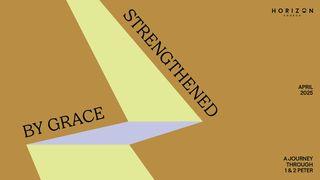Listening for Answers to the Questions Every Teenager Is AskingSample

Day Two
Discipleship as a Way of Life
Scripture: Matthew 4:19; 2 Corinthians 1:19-20; Philippians 2:12
As we love teenagers through listening to them, we long for them to have a meaningful relationship not just with us but with God.
In the Gospels, we see Jesus encounter all kinds of people and extend all kinds of invitations. But perhaps the most alarming and poignant is when he looks someone in the eye and offers, “Come, follow me.” (For example, Matthew 4:19; Mark 1:17; Luke 5:27; John 1:43.)
The stakes are high. The ask is big.
Answering yes changes everything.
It’s been wisely said that when we follow Jesus, we say “one big yes” followed by a thousand little yeses each day. Teenagers in our lives need to see discipleship as a journey, a long pilgrimage, grounded in the stuff of normal life. It’s holistic, embodied, and concrete.
God’s first word to us is “Yes,” and in response, our yes is to look toward God and ask, “What today?” Today’s yeses could look like reaching out to a hurting friend, seeking God through reflective prayer, or connecting with other disciples.
Our daily discipleship is a combination of the power of God at work to transform us and our “working out” our stories through what we do, say, and believe. It’s about who we are and who we are becoming. (See Philippians 2:12; Philippians 3:12; Romans 12:1–2.)
This process of spiritual formation helps answer two key questions teenagers are asking: Who am I? and Where do I fit?
We do not follow Jesus in isolation. Discipleship is never only about “me” but always implies “us” at the family, church, community, society, and global levels—it’s our everyday “Yes.” When we model this in our own lives, we share our identity as disciples and our place as belonging with God’s people.
So instead of a form of discipleship reduced to only behavior, belief, or relationship, as many teenagers today may see it, we can invite them into a more robust way of life based on trust. Full integration of those three important elements. A yes—today, tomorrow, and every day after.
Which of these three elements of being a Christian do you think teenagers today lean toward most? Why do you think many teenagers tend toward focusing on one element of Christianity rather than a full integration of faith?
About this Plan

Whether you’re a teacher, mentor, parent, grandparent, youth worker, or pastor, you want to understand teenagers better and have more meaningful connections with them. One of the best ways to do this is to know the most pressing questions of their hearts and minds. This week we’ll look at three key questions today’s teenagers are asking and how we can respond to them through the lens of God’s love.
More
We would like to thank Baker Publishing for providing this plan. For more information, please visit: https://bakerbookhouse.com/products/260825
Related Plans

Job Book Study - TheStory

Bible in 260 Days

God as Your Planmaker - Jeremiah 29:11

Horizon Church April Bible Reading Plan - Strengthened by Grace: A Journey Through 1 & 2 Peter

I Know A Name

The Gospel of Luke - Devotionals

Embracing Your Identity as a Daughter of the King Through Infertility

Resurrection Hope: Finding Victory in Life’s Hardest Moments With Aaron Williams

Spiritual Virtues for the Modern Man
